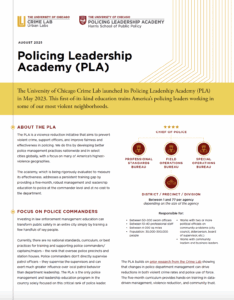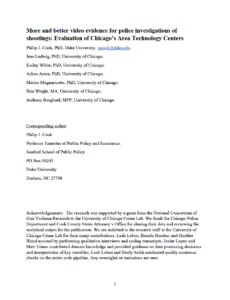Jun 2021
How the Pandemic is Accelerating Carjackings in Chicago
In 2020, Chicago saw more carjackings than in the previous two years combined. In our June Data Points column in the Chicago Tribune, we explore what is behind the recent surge. One much discussed (and debated) argument is that young people, teens particularly, are driving the increase. Taken together, evidence from carjacking arrest data, victim estimates of suspect age, clearance rates, and arrest trends in other cities indicate that increased youth involvement is driving the uptick in carjackings. This growing youth involvement suggests that the pandemic may be contributing to the rise in carjackings but not as a result of what many in the public might have assumed — economic dislocation. We see in the data, for example, that youth involved in carjacking are more likely to live in areas with lower internet access and school attendance, especially during the pandemic. We also show that Chicago is currently missing many potential contact points with these youth that could be used to, for instance, connect them to social services at a time when they need them most.
In any data analysis, there are many detailed decisions to make due to uncertainties or intrinsic limitations to the data themselves, as well as reasonable alternative choices about how to analyze and present the results. Because of limited space in the Datapoints column, we have omitted many of those details and sensitivity analyses from the published version. We provide those additional details here.

Policing Leadership Academy (PLA) Overview
Read an overview of the Policing Leadership Academy (PLA), a first of-its-kind program launched in May 2023 to train America’s policing leaders working in some of our most violent neighborhoods.

Policing Leadership Academy Advisory and Research Committees
View the members of the PLA’s advisory and research committees.

More and better video evidence for police investigations of shootings: Evaluation of Chicago’s Area Technology Centers
This evaluation explores the early effects of the Chicago Police Department’s Area Technology Centers (ATCs), first launched in 2019 to provide specialized investigative support in homicide and nonfatal shooting investigations.

Video: Reducing Violence and Improving Policing
This video offers a glimpse into the Policing Leadership Academy, a violence reduction initiative designed to prevent violent crime, support officers, and improve fairness and effectiveness in policing throughout some of the country’s most violent neighborhoods.
Latest Updates
Former NYPD Chief of Department Kenneth E. Corey Named Executive Director of the Policing Leadership Academy
CHICAGO, IL — The University of Chicago Crime Lab today announced that Kenneth E. Corey has been appointed Executive Director of its Policing Leadership Academy (PLA), a first-of-its-kind executive education program designed to help police leaders reduce gun violence and build trust in the communities they serve.

Homicide rate declines sharply in dozens of US cities, a new report shows
The AP’s Claudia Lauer speaks with Crime Lab faculty director Jens Ludwig about the declining homicide rate in cities across the United States.

What it will take to fix American policing
Host Megan McArdle speaks with former New York City police commissioner William Bratton and former NYPD chief and new Policing Leadership Academy executive director Kenneth E. Corey about their work at the Academy and the program’s goals to reduce violence and improve fairness in policing.

